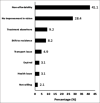Factors affecting compliance to intravitreal anti-vascular endothelial growth factor therapy in Indian patients with retinal vein occlusion, age-related macular degeneration, and diabetic macular edema
- PMID: 32971626
- PMCID: PMC7728040
- DOI: 10.4103/ijo.IJO_1866_19
Factors affecting compliance to intravitreal anti-vascular endothelial growth factor therapy in Indian patients with retinal vein occlusion, age-related macular degeneration, and diabetic macular edema
Abstract
Purpose: To evaluate the rate of compliance and the reasons for loss to follow-up in Indian patients with diabetic macular edema (DME), age-related macular degeneration (AMD), and retinal vein occlusion (RVO) being treated with anti-vascular endothelial growth factor (VEGF) therapy.
Methods: This was a retrospective single-center study. Patients with DME, AMD, or RVO were eligible if they initiated anti-VEGF therapy between January 2013 and December 2017. Patients' data were obtained from hospital electronic records, including the number of injections received, visits, details of follow-up, missed appointments, and reasons for loss to follow-up (>365 days).
Results: A total of 648 patients were eligible for the study, of which 334 (51.54%) patients were lost to follow-up. Overall, 343 (64.96%) were males and the overall mean (SD) age was 66.40 (7.44) years. A total of 376 (58.0%) patients had a history of diabetes and 364 (56.2%) patients had a history of hypertension. Further, 127 (38.0), 112 (33.5), and 95 (28.4) had DME, AMD, and RVO, respectively and were lost to follow-up. The most commonly reported reason for loss to follow-up was "non-affordability" (n = 120; 41.1%) followed by "no improvement in vision" (n = 83; 28.4%). "No improvement in vision" (42.2%) and "non-affordability" (37.5%) were higher among patients with DME. No association was found in gender- and treatment-wise distribution of reasons for loss to follow-up.
Conclusion: The results showed that around half of the patients with DME, AMD, and RVO were lost to follow-up to intravitreal anti-VEGF therapy, and the most common factors were "non-affordability" and "no improvement in vision."
Keywords: Follow-up; intravitreal injection; patient compliance.
Conflict of interest statement
None
Figures
References
-
- Freund KB, Mrejen S, Gallego-Pinazo R. An update on the pharmacotherapy of neovascular age-related macular degeneration. Expert Opin Pharmacother. 2013;14:1017–28. - PubMed
MeSH terms
Substances
LinkOut - more resources
Full Text Sources
Medical


